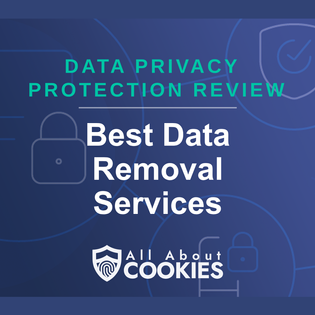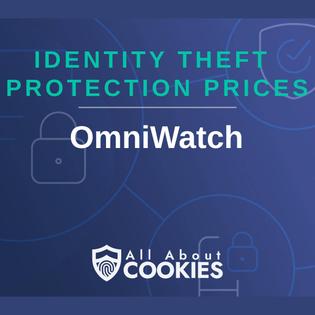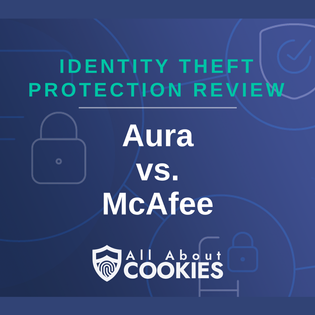All About Cookies is an independent, advertising-supported website. Some of the offers that appear on this site are from third-party advertisers from which All About Cookies receives compensation. This compensation may impact how and where products appear on this site (including, for example, the order in which they appear).
All About Cookies does not include all financial or credit offers that might be available to consumers nor do we include all companies or all available products. Information is accurate as of the publishing date and has not been provided or endorsed by the advertiser.
The All About Cookies editorial team strives to provide accurate, in-depth information and reviews to help you, our reader, make online privacy decisions with confidence. Here's what you can expect from us:
- All About Cookies makes money when you click the links on our site to some of the products and offers that we mention. These partnerships do not influence our opinions or recommendations. Read more about how we make money.
- Partners are not able to review or request changes to our content except for compliance reasons.
- We aim to make sure everything on our site is up-to-date and accurate as of the publishing date, but we cannot guarantee we haven't missed something. It's your responsibility to double-check all information before making any decision. If you spot something that looks wrong, please let us know.
Knowing how to spot a Cash App scam, combined with Cash App’s policies to keep your data safe and transactions secure, means you can confidently use this convenient money-sharing app. While the prevalence of these scams might be rising, mobile payments are still a safe, secure way to pay if you know how to spot fraudsters.
Keep reading to learn more about what to look for and how to avoid Cash App scams, as well as how to add another layer of protection with a good identity theft protection service.
How does Cash App work?
11 tips to protect yourself on Cash App
What to do if you're a victim of a Cash App scam
FAQs
Bottom line
How to avoid 12 common Cash App scams
Scammers change tactics frequently. Understanding how these popular scams work and knowing what red flags to look for can help you avoid becoming a victim of a Cash App scam. Here are some of the most common Cash App scams:
1. Fake refunds
This typically happens when a fraudster claims to have sent multiple payments through Cash App and demands a refund, requiring you to issue a refund for a payment you never received.
Like many Facebook Marketplace scams, this Cash App scam is one to be aware of if you sell goods or merchandise online. If you’re selling something on an online marketplace, scammers may take this opportunity to swindle you out of money.
2. Accidental payment
With this scam, a fraudster “accidentally” sends you money. They then message you and ask for the money back. If you send the money back, it comes from your own account. The scammers then dispute the payment with their bank or credit card, essentially doubling the amount of money they end up with.
You can report scam payments in Cash App with these steps:
- Tap your profile icon found in the upper-right corner.
- Choose Support, then Report a Payment Issue.
- Choose the payment you want to report and follow the prompts.
3. Messages asking you to claim a prize
Similar to an accidental payment, a fake prize is an easy way for fraudsters to target victims. Scammers message you claiming you’re the recipient of a prize — but you’ll need to send in a small fee to claim your prize.
This is a scam. Cash App will never ask you to pay for a prize.
If someone on Cash App contacts you and you think they’re a scammer, you can report and block them using these steps:
- Tap the user’s avatar to view their profile or search for their profile using a name, $Cashtag, phone number, or email address.
- Scroll to the bottom of the user’s profile and tap Report or Block.
- Select one of the options that appear and follow the prompts.
4. Social Security number requests
Requests for sensitive, personal information like Social Security numbers may seem legitimate, but it’s a way for scammers to get the information they need to access your Cash App account.
It’s important to note that Cash App won’t ask for your Social Security number after your initial setup — and won’t ask for other personal info like your login credentials either. If someone claiming to be Cash App support requests this information, it’s an indication it’s a scam.
5. Fake Cash App support representatives
A popular tactic used by scammers is creating a fake phone number and listing it as Cash App customer support. When you call the fake customer support and share private, sensitive information, you are giving fraudsters access to your account.
For victims involved in this type of scam, it’s very difficult to recoup lost finances. Cash App customer support is available only through the app and through the customer support phone number found on the official website.
If someone asks you to provide your Cash App PIN or Social Security number, or asks you to send payment, it’s likely a scam and you should end communication immediately.
6. Fraudulent government relief payments
Since COVID-19, government relief payment scams have been on the rise. A scammer might create a fraudulent grant or government program to swindle Cash App users out of money and charge victims a fee.
7. Fake account security alerts
In this phishing scam, fraudsters send official-looking emails claiming there’s a security breach and your Cash App account may be compromised.
Victims of phishing scams are directed to enter sensitive information into fake websites, inadvertently sharing private information. Remember, if you receive a suspicious email, message on social media, or a text message from a number you don’t know claiming you need to enter information about your Cash App account, it’s best to do your due diligence to make sure it’s actually from Cash App.
Verified emails will always come from an @cash.app, @square.com, or @squareup.com email address. If you receive notifications you believe are a scam, report them to Cash App as soon as possible.
8. Cash flipping
Cash flipping is where scammers post on social media advertising huge returns on cryptocurrency or other investments — you just need to send them a nominal upfront investment via Cash App.
But instead of an investment, you’re sending money directly to the scammer and they never deliver on their promise to multiply your investment.
Just like paying to claim a prize, if someone asks you to send them money and promises to return larger dividends, it’s likely a scam.
9. Pet deposit scam
Scammers claim to have an upcoming litter of animals and request a deposit to claim a puppy or kitten. Sometimes, the fraudsters even include fake photos and claim to offer pure-bred, highly sought-after animals at a deeply discounted rate.
You send a deposit, but won’t see your new four-legged friend. Cash App can’t guarantee a return on an item you don’t receive, so the scammer makes off with your deposit.
10. Rental deposit scam
Similar to the pet deposit scam, in a rental deposit scam, fraudsters promise an apartment or home rental at a low rate in exchange for a deposit. Often, they promise this service without ever providing proof that the apartment actually exists.
If someone requires a deposit before you’ve even toured the apartment, it’s likely a scam.
11. Fake transaction verification
Scammers use fake transaction verification methods to trick you out of money by creating fake, official-looking notices saying there are concerns about fraudulent activity on your account. They’ll ask you to confirm your account information by sharing it with them so they can “verify,” but they’re really tricking you into handing over personal information.
12. Catfishing scams
Another popular Cash App scam is catfishing, or when someone takes another person’s information and identity to create a new identity for themselves. Scammers use this fake identity to romance victims online and then leverage the relationship — and the victim’s funds — to cover an “emergency” or a face-to-face visit that never actually happens.
How does Cash App work?
Cash App is a mobile peer-to-peer payment service that allows you to buy, sell, and transfer money, stocks, and bitcoin without the usual fees traditional banking incurs. Once the app is installed, you can make or receive payments with just a few quick clicks.
Is Cash App safe to use?
Like any mobile-to-mobile payment app, Cash App is overall safe to use.
Cash App uses encryption and fraud detection technology to protect your data and money. All information submitted in the app is encrypted, regardless of whether you’re using public or private Wi-FI, and the app offers two-factor authentication.
Additionally, Cash App is PCI Data Security Standard (PCI-DSS) Level 1 compliant, which is the highest level of compliance and payment standards merchants can comply with to securely store, transmit, and process credit card information.
12 tips to protect yourself from Cash App scams
While Cash App offers added security measures to ensure your information is safe, there are best practices you can implement to protect your financial transactions and data online:
- Verify email addresses: It’s best to only respond to emails and messages from people you know and trust. If an email is supposedly from Cash App, check the email domains to ensure they’re verified Cash App email addresses.
- Don’t click on external links: Verified Cash App emails won’t contain links to any sites other than square.com, squareup.com, cash.app, or cash.me. If you receive an email with links to any other websites, it’s a red flag that the email is fraudulent and likely part of a scam.
- Double-check transactions: Before sending payment, double-check transactions are going to the intended recipient.
- Never send money to strangers: If someone contacts you claiming you’re the recipient of a prize and you need to send payment to claim the prize, it’s best to ignore the message and report it to Cash App.
- Never buy something before you see it: Many Cash App scams operate on the premise of false goods or services. For example, don’t put a deposit down on a puppy until you’ve seen the litter in person, or put a deposit on an apartment you haven’t toured yet.
- Contact Cash App customer support directly: To avoid a Cash App customer support scam, contact Cash App customer support only through the app or the listed phone number on the Cash App website.
- Keep personal identifying information private: Scammers go to great lengths to trick victims out of cash, including surveying other social media sites to get as much personal information about them as possible. Be wary of posting too much about yourself on social media sites or other online forums.
- Don’t share your login codes: When you sign in to Cash App, it sends you a one-time use code to log in. If you receive a login code without requesting one or receive a message from a Cash App user asking for your one-time login code, it’s likely a scam. This is a good time to change your account password too.
- Turn on notifications: In your account settings, turn on notifications so you’re immediately aware of any transactions associated with your account.
- If it sounds too good to be true, it probably is: The old adage rings true with Cash App scams: if something sounds too good to be true, it probably is. If someone offers you free money or an investment opportunity, the best thing to do is ignore the fraudster and contact Cash App support.
- Use two-factor authentication: For added security, enable two-factor authentication on your account. Even if someone has your account credentials, they cannot log in without your Cash App PIN.
- Look for red flags: Cash App will never ask for your PIN or Social Security number, and it will never charge you or require a deposit to facilitate any “test” on your account. The Cash App team also won’t ask you to download software for remote access to your device or account.
These tips can apply to all payment apps, including PayPal, Venmo, and Zelle.
What to do if you’re a victim of a Cash App scam
If you’ve been targeted by a Cash App scam, there are straightforward steps to take to rectify the situation.
- Report the scam to Cash App customer service and immediately cease contact with the scammer.
- If applicable, contact your bank and alert them to possible fraudulent charges. Be sure to check your credit report to ensure no further damage has been done
- Consider signing up for identity theft protection services, which can help you monitor your bank account information for fraud and help you recover if someone does scam you on Cash App — or anywhere else.
The best identity theft protection services to help protect you from scams
| Service |  |  |
 |
| Individual monthly price | Starts at $7.50/mo (billed annually) for first year | Starts at $9.00/mo (billed annually) | Starts at $10.00/mo |
| Family monthly price | Starts at $18.49/mo (billed annually) for first year | Starts at $25.00/mo (billed annually) | - |
| ID theft insurance | Up to $3 million | Up to $1 million per adult | Up to $2 million |
| Credit monitoring | |||
| 3-bureau credit reports | |||
| Details | Get LifeLock Read Our LifeLock Review |
Get Aura Read Our Aura Review |
Get Omniwatch Read Our Omniwatch Review |
FAQs
How do you tell if someone is a Cash App scammer?
Generally speaking, if someone sends you a direct message or email requesting your sign-in code or PIN, asks you to send them money, or asks for personal information, it’s likely a Cash App scam.
Is it safe to receive money on Cash App from strangers?
As a general rule of thumb, it’s unsafe to accept money on any mobile-to-mobile payment app from strangers.
How do you cancel transactions on Cash App?
Cash App transactions are instant and usually can’t be canceled. Check your activity feed to see if the recipient is displaying a cancel option. If the option to cancel your payment is unavailable, you can submit a request to refund your payment through the app.
Can someone steal money from you if they have your Cash App?
With just your Cash App username, scammers aren’t able to access your account or your Cash App funds. Fraudsters need more information to steal your money from your Cash App account.
Which is safer: PayPal, Venmo, Zelle, or Cash App?
Bottom line
Fraudsters are lurking in nearly every corner online, from Venmo scams to Cash App scams, but knowing what to look for can give you an edge over scammers. When it comes to protecting yourself against any sort of scam, if it sounds too good to be true, it usually is.
Scammers incentivize unsuspecting victims with lures of quick Cash App payments, love, high-price items at a lower cost, or even pretending to be a Cash App support representative. Because online payments are so convenient and easy, an increasing number of people are using them, so this gives scammers ample opportunities to wreak havoc. Now, more than ever, identity theft protection is worth adding to your arsenal of protection against fraud.








